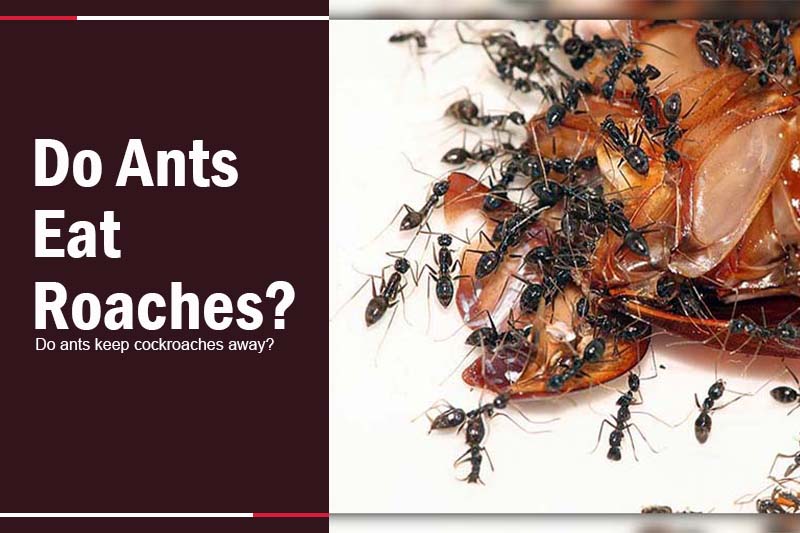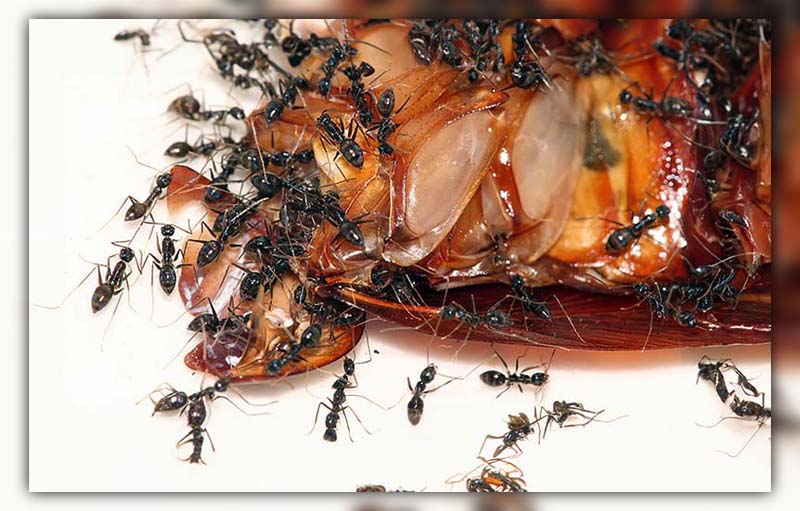Roaches are one of the most common and annoying pests that can infest your home or garden. They can carry diseases, damage your property, and cause allergies. But did you know that there is another insect that can help you fight them? That’s right, we are talking about ants.
Ants eat roaches and can reduce their population and activity. But how do ants eat roaches and why do they do it? And how can you use this knowledge to your advantage?
In this blog, we will answer all these questions and more. We will also give you some tips on how to control ants and roaches effectively and naturally.

Do Ants eat Roaches?
According to some sources, ants do eat cockroaches, especially dead ones. Most ants don’t bother live roaches and only eat dead ones that they come across when they forage and try to find food.
However, there are aggressive species such as the red imported fire ants (RIFA) and Argentine ants that prey on them. These aggressive ants, when possible, will swarm, kill, and feed on cockroaches
Why Do Ants Eat Cockroaches?
Ants are known for their highly opportunistic eating habits, consuming a wide range of food sources they encounter. With their status as omnivores and detritivores, ants exhibit a versatile diet, including plant matter and various types of meat. This includes both living and deceased insects, such as bees, termites, and notably, cockroaches.
Their dietary flexibility even extends to consuming ants from their own colony when resources are scarce.
Cockroaches, being a prevalent insect species, become a viable food source for ants due to their ubiquity and vulnerability. The practice of consuming cockroaches holds a range of benefits for ants, coupled with the nutritional value they offer. Interestingly, cockroaches’ nutritional benefits extend beyond ants and even impact humans.
Research reveals that cockroaches boast a rich nutritional profile, packed with diverse nutrients that offer advantages to those who consume them. Notably, cockroaches are a valuable source of protein.
This protein content proves vital for ants as it can be either directly utilized or broken down to construct essential compounds like enzymes, hormones, and structural proteins crucial for their growth and development.
The carbohydrate content of cockroaches also holds significance for ants. Carbohydrates are a fundamental energy source, crucial for various bodily functions including respiration. Moreover, the moisture content in cockroaches is noteworthy, as it plays a role in preventing ants from desiccation or drying out.
However, it’s the mineral content of cockroaches that truly underscores their nutritional importance. Cockroaches are rich in both micro and macro minerals, contributing to the well-being of ants:
- Calcium: Essential for ant egg production, larval development, and physiological regulation.
- Magnesium: Contributes to the hardening of ant exoskeletons, aiding in infection prevention and enhancing the survival rate of worker ants in specific species.
- Potassium: Aids in the regulation of nerve function and muscle repair, essential for ants’ overall vitality.
- Phosphorus: Vital for the growth, maintenance, and repair of ant tissues and cells, as it forms a key component of cell membranes.
- Sodium: Contributes to fluid balance maintenance and promotes optimal muscular and nerve function in ants.
- Manganese: Assists in the hardening and sharpening of specific ant body parts, enhancing their structural integrity.
- Zinc: Similar to manganese, zinc plays a role in strengthening and sharpening ant teeth, a vital aspect of their feeding behavior.
In conclusion, ants’ consumption of cockroaches is rooted in their opportunistic nature, as they exploit available food sources to sustain their colonies. The nutritional value offered by cockroaches, including protein, carbohydrates, moisture, and a variety of minerals, contributes significantly to ants’ growth, development, and overall well-being.
This intricate relationship between ants and cockroaches showcases the fascinating interplay within ecosystems and the resourcefulness of nature’s inhabitants.
Ants that eat cockroaches
Most ants can eat cockroaches but will always take advantage of the dead ones. This is because while still alive, roaches can also detect danger and defend themselves. If they are attacked, they will respond by fleeing and this can easily distract most ants since an ant cannot outrun a roach.
Here are some indoor ants that are known to attack and eat cockroaches:
Fire ants
The most notorious species that are known to attack and eat roaches both indoors and outdoors are the fire ants (red ants). They do not spare any crawling insects or animals that stand in their way especially when they are migrating. Even a single fire ant can still attack a huge roach while it waits for backup.
In most cases, the presence of a single red ant in an area means that there are several nearby. If it is aggressive enough to attack, it means that it is sure of help from the rest which will easily pick up its pheromones. Fire ants always move in colonies especially during the cold seasons while looking for warm habitats.
Meat ants
Meat ants can also bite and eat cockroaches if they come across them. When they are hungry, meat ants are very aggressive. Even though they do not sting, they can bite and tear into their prey with ease because their mouthparts are well designed for that.
When grease ants are moving as a colony and they lack food they can even attack roaches in cracks and dark areas. They will simply go in and attack and since roaches do not like intruders in their hiding areas, most of them will take off while the ants will kill and eat their weak ones.
Grease ants
Grease ants can feed on cockroaches because they like food that is rich in proteins. Roaches provide that even if they are dead and this is why you will always find those tiny yellow-like ants all over a dead roach. These ants will also eat other dead insects around the house and they can easily infest your home in large numbers because they have a variety to feed on at home.
During the cold seasons, grease ants will move indoors in search of warmth and food. Since roaches also like meaty and oily foods, they like preying on them. They can also attack old or young roaches that are too weak to defend themselves. If the roach is from crawling on sweet oily food, it is at a high risk of being trailed and eaten.
Argentine ants
Argentine ants will only eat dead roaches and that is only when they are extremely hungry with nothing to eat. They are omnivorous in nature but they prefer sugary and tasty food. Therefore they are likely to go for tasty meals in your houses like sugary juice tea, honey, and oily tasty food.
Naturally, Argentine ants will not attack roaches as the army ants do. In fact, they have been observed to avoid other insects unless they are attacked and are forced to fight back. They can also prey on other insects if there is nothing to eat in the house. Keeping your house clean is a good way of natural control because pests are likely to turn on each other for survival.
Carpenter ants
Carpenter ants can eat roaches whether they are dead or alive because they love protein. While outdoors, they can attack other insects and feed on them. If they come into your home, they can eat almost anything from dead insects to sugary meals and vegetables. They do not mind crawling on dirty dishes or spilled food on the floor while scavenging for food.
As compared to other insects, carpenter ants are relatively huge and they have the ability to attack indoor pests like roaches. They have mouth parts that can bite and kill their prey. However, they rarely attack humans unless they are provoked and they have an urge to defend themselves. They are also less likely to attack your pets but they can eat their food if left uncovered.
Do Ants keep Cockroaches away?
As much as ants can kill and eat cockroaches, they cannot be relied on to keep roaches away. Ants will only eat roaches for survival when they are hungry. They do not come indoors to specifically hunt the roaches down. Therefore, you cannot say that ants can keep roaches away.
If there is plenty to eat for both ants and roaches, it is rare to see ants and roaches fighting each other for survival. They will both keep off each other and will focus on the food. They only attack each other if the house is extra clean with nothing to eat. Roaches will also eat dead ants if that is all they can find when they lack food.
Do Cockroaches eat Ants?
On the other hand, roaches can also eat ants but only if they are dead. They can never attack live the live ones because ants can bite or sting while defending themselves. Ants may be tiny but they are good at fighting back. Therefore, cockroaches can only eat dead ants if they find any.
If a roach happens to attack a group of ants that are alive, it can be easily overpowered by stings and bites. Ants are good at working together and a colony of them can easily overpower other insects and bugs that are a threat to them.
Old and young roaches are always vulnerable to ants because they are desperate for food. Therefore, they will even try to eat live ants and that is when they get attacked and killed in the process. A single ant can also signal the rest of the colony when it is in danger and this way, a roach may not stand a chance of killing and eating it especially if a colony is around.
Can Roaches and Ants Live Together?
In nature’s surprising twists, ants and cockroaches can indeed share living spaces. A captivating instance of this involves Attaphila cockroaches and leafcutter ants. These cockroaches mimic the ants’ scent and appearance, infiltrating their colonies unnoticed. This clever strategy grants them access to the ants’ fungal food source. This coexistence underscores the fascinating ways in which different species adapt and collaborate within ecosystems.
Conclusion
In this blog, we have answered the question: do ants eat roaches? We have learned that some ants, such as fire ants and Argentine ants, do prey on cockroaches and use them as a food source. We have also explored the reasons why ants eat roaches, such as to obtain protein, to reduce competition, and to protect their colonies. We have also discussed how ants and roaches interact in different environments and how to control them effectively using natural or chemical methods.
We hope you have enjoyed reading this blog and learned something new about these fascinating insects. If you want to know more about ants, roaches, and other pests, check out our other blogs from Pestweek.

Calina Mabel has over 15 years of experience in the field of journalism and communications. Currently, Calina Mabel is the Content Writer for categories such as Cockroach, Ants, Bed Bugs, Mosquito, Rodent, Termite, and Flies on Pestweek.com. She aims to build content for these categories with a focus on providing valuable and accessible information to readers, in order to create the world’s largest knowledge community about Pests.
All content written by Calina Mabel has been reviewed by Emily Carter.




